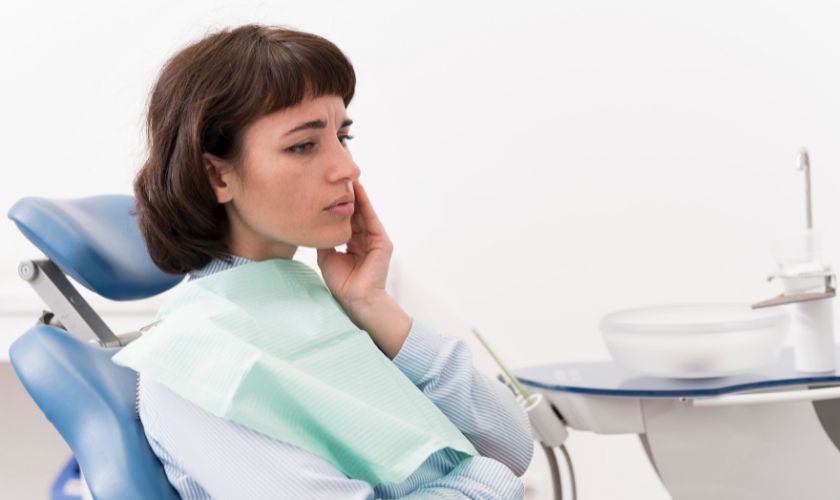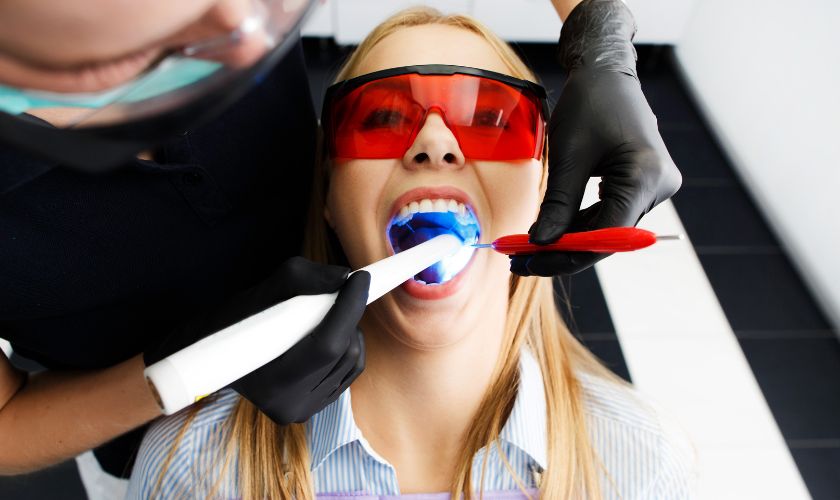(703) 372-5665
The Definitive Guide to Professional Teeth Whitening

The Definitive Guide to Professional Teeth Whitening
A bright, white smile is often associated with good health and confidence. However, teeth can become stained or discolored over time due to factors like genetics, aging, and lifestyle habits such as smoking or drinking coffee. Thankfully, there are several options available for teeth whitening that can help restore your pearly whites to their former glory. In this definitive guide to professional teeth whitening, we’ll explore the different types of treatments available and provide tips on how to choose the best method for you. So sit back, relax, and get ready to discover everything you need to know about achieving a dazzling smile!
The Different Types of Teeth Whitening
There are various types of teeth whitening treatments available, ranging from at-home solutions to professional in-office procedures. One popular option is over-the-counter whitening strips, which typically use hydrogen peroxide or carbamide peroxide gels to bleach the teeth.
Another type of at-home treatment involves using custom-made trays that fit snugly over your teeth and hold a bleaching gel. These trays are often provided by dentists and offer more precise results than generic store-bought kits.
In-office professional treatments can provide faster and more dramatic results due to their higher concentration of bleaching agents. Typically, a dentist will apply a strong hydrogen peroxide solution directly onto the teeth and activate it with heat or light.
Laser teeth whitening is another in-office procedure that uses laser energy to accelerate the bleaching process. This option may be more expensive than other methods but can provide noticeable results in just one session.
Ultimately, the best type of treatment for you will depend on factors such as your budget, desired level of whitening, and any existing dental issues you may have. It’s always best to consult with a dental professional before starting any new whitening regimen.
Pros and Cons of Teeth Whitening
Teeth whitening is a popular cosmetic dental procedure that can boost one’s self-confidence and enhance their overall appearance. However, like any other medical procedure, teeth whitening has its pros and cons.
One of the biggest advantages of teeth whitening is that it helps to remove stains caused by coffee, tea, tobacco products, and food. This results in a brighter and healthier-looking smile. Teeth whitening also reduces the signs of aging on your teeth.
On the downside, some people experience tooth sensitivity after undergoing a teeth whitening procedure due to the ingredients used in the bleaching agent. Additionally, overuse or misuse of at-home teeth-whitening kits can lead to enamel damage or gum irritation.
It’s important to note that not everyone is an ideal candidate for teeth whitening procedures. Pregnant women or individuals with weakened enamel may need to avoid these treatments altogether. Furthermore, if you have dental restorations such as veneers or crowns in place already on your front surfaces will not change color during treatment; meaning they would still stand out from newly-bleached natural surrounding tooth structure which could be aesthetically displeasing for some patients,
Ultimately, consulting with a dental professional before deciding on any form of treatment should be prioritized so proper evaluation tailored specifically for each individual case will lead towards achieving optimal results while minimizing potential risks associated with this type of aesthetic dentistry solution
How to Choose a Teeth Whitening Method
When it comes to teeth whitening, there are a variety of methods available. With so many options out there, it can be difficult to choose the right one for you. Here are some factors to consider when selecting a teeth whitening method:
1. Severity of Stains: Depending on how severe your tooth discoloration is, different methods may work better than others. For minor stains, over-the-counter products like whitening toothpaste or strips may suffice. However, more serious cases may require professional treatment.
2. Sensitivity: If you have sensitive teeth or gums, certain types of teeth whitening treatments may cause discomfort or pain. Be sure to consult with your dentist if you experience sensitivity before trying any type of treatment.
3. Time Frame: Some teeth whitening methods take longer than others to achieve desired results – this is another factor worth considering based on your personal preferences and schedule.
By taking these factors into account and consulting with your dental professional as needed, you’ll be able to select the best possible option for achieving that brighter smile!
DIY Teeth Whitening
DIY teeth whitening has been a popular trend for people who want to achieve a brighter smile without having to spend too much money on professional treatments. There are many methods that you can try at home, but it is important to note that not all of them have been scientifically proven to be effective or safe.
One of the most common DIY teeth whitening methods is using baking soda and hydrogen peroxide. Baking soda acts as an abrasive substance that helps remove surface stains, while hydrogen peroxide is a bleaching agent that can lighten the color of your teeth. However, this method may cause tooth sensitivity and gum irritation if used excessively.
Another option is oil pulling, which involves swishing coconut oil around your mouth for several minutes before spitting it out. Some people believe that this practice can help remove plaque and bacteria from their teeth, leading to a whiter smile. However, there is limited research on its effectiveness.
Using fruit peels such as banana peels or orange rinds is also another popular DIY teeth whitening method. These fruits contain natural enzymes that could potentially break down stains on your teeth’s surface; however, more studies need to be done in order for this theory to be backed up by science.
While DIY teeth whitening may seem like an affordable solution for achieving a brighter smile at home, it’s still important to consult with dental professionals first before attempting any treatment on your own – regardless of whether they’re commercially available or homemade remedies found online.
Professional Teeth Whitening
Professional teeth whitening is a popular cosmetic dental procedure that involves the use of advanced technology and techniques to achieve a brighter, whiter smile. While there are many over-the-counter products available for whitening your teeth, professional treatments offer more effective and long-lasting results.
One of the biggest advantages of professional teeth whitening is that it is performed by a licensed dentist or dental hygienist who has undergone specialized training in this area. This means that they have access to high-quality materials and equipment designed specifically for teeth cleaning and bleaching.
Most professional teeth whitening procedures involve applying a concentrated peroxide gel to the surface of your teeth using custom-made trays or laser light technology. The process usually takes less than an hour, depending on the severity of discoloration or staining.
Another benefit of professional teeth whitening is that it can be tailored to meet individual patient needs. Your dentist will assess your oral health condition, and examine any existing restorations such as crowns or fillings before prescribing you a treatment plan best suited for you.
If you want quick and lasting results without compromising on quality then Professional Teeth Whitening could be just what you need!
Conclusion
In summary, teeth whitening is a great way to enhance your smile and boost your confidence. There are various methods available for you to choose from depending on your budget, preferences, and goals. DIY teeth whitening may seem like a cost-effective option, but it comes with risks that could damage your teeth and gums.
On the other hand, professional teeth whitening offers better results in terms of speed, safety, and effectiveness. It also gives you access to advanced technology that can target even the most stubborn stains.
Before choosing any method of teeth whitening, make sure to consult with a dental professional who can assess if it’s safe for you. Always follow the instructions carefully and avoid overusing products as this can lead to tooth sensitivity or other complications.
Remember that while having white teeth is desirable, good oral hygiene should always be at the forefront of your dental care routine. Brushing twice daily with fluoride toothpaste and flossing regularly will help maintain healthy gums and prevent further staining.






